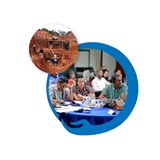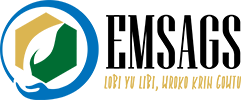Our stakeholders and partners
Stakeholder engagement
The overall objective of stakeholder engagement in the EMSAGS project is to ensure acceptable[1] and effective[2] inclusion of groups that have a stake, interest or right where mining is taking place and those who make used of the forest and those that will be affected positively or negatively by the mining activities.
Furthermore, the EMSAGS project wants to ensure that:
- Through stakeholder engagement special attention is given to stakeholders that are currently involved in mining
- Stakeholder engagement build capacity to upgrade the stakeholders’ participation level, particularly for vulnerable groups.
- Changes in stakeholder engagement is tracked by effective monitoring and timely evaluation of the engagement activities executed during the project.
[1] Acceptable inclusion: stakeholders agree with the process and method for stakeholder engagement.
[2] Effective inclusion: stakeholders understand the EMSAGS project and environmentally responsible mining and can give specific valuable and timely input according to a defined role.
Stakeholders
The project will rely on the participation of a broad spectrum of stakeholders from government, civil society, academia and local communities.
The project will work through the Ministry of Natural Resources and NMA, in coordination with other governmental and non-governmental partners. Partnerships will be established with national and international NGOs to achieve its intended results. The key government departments and organizations with responsibilities in the gold mining sector are listed in the table below

The Stakeholder Platform (SP)
The SP will support the PB and the PMU with technical guidance, specifically on social-economic, environmental and gender related actions in the implementation of the project. The SP will meet quarterly per year, or more as needed.
Composition
The composition of the core SP is proposed as follows:
- Ministry of Natural Resources, represented by GMD
- Ministry of Health
- Ministry of Education
- Ministry of Regional Development and Sport
- Ministry of Spatial Planning and Environment
- National Environment Authority (NMA)
- The Foundation for Forest Management and Production Control (SBB)
- Anton de Kom University of Suriname, environment or geological department:
- Field of study: Geosciences
- Field of study: Environmental Sciences
- Suriname Office of Standards (SSB)
- NGO’s, represented based on thematic areas
- Large scale mining companies:
- Zijin Rosebel Gold Mines N.V.
- Newmont
- Artisanal Gold Council (AGC)
- Alliance for Responsible Mining (ARM)
- Commission for the Regulation of Gold Sector (OGS)
- The National Assembly, represented by a member of the environment commission
NGO’s per thematic area
|
Thematic Area |
Organization |
|
Environment |
Conservation International (CI) |
|
World Wildlife Fund (WWF) |
|
|
Urban Planning |
Spatial Planning Association Suriname (SPASU) |
|
Mining |
Stichting Houders Mijnbouw rechten Foundation of Mining Rights Holders (SHMR) |
|
Association SSM Makamboa (Brokopondo) |
|
|
Association SSM Paamaka |
|
|
Association SSM Camp Mining (Brokopondo) |
|
|
Indigenous and tribal communities |
Maroon Communities – KAMPOS |
|
Vereniging van Inheemse Dorpshoofden in Suriname (VIDS) |
|
|
Organisatie van Inheemse Volken in Suriname (OIS) |
|
|
Industry |
Suriname Trade and Industry Association (STIA/VSB) |
|
Suriname Business Forum (SBF) |
The key roles of the Stakeholder Platform
- Review progress and recommend adaptive actions, if any, to the PMU;
- Recommend specific actions related to social-economic, environmental and gender related project activities;
- Provide technical guidance for engaging with communities, with emphasis on communities surrounding the mining areas and miner’s associations, as well as other key stakeholders;
- Pro-actively consider issues arising under safeguards policies (Free Prior Informed Consent, public disclosure, national or international agreements) and recommend preventive or mitigation actions;
- Provide a forum for stakeholder’s consultation and information sharing;
- Review and comment on policy and guideline documents and other documentary outputs of the project;
- Promote the upscaling of project result through dissemination to relevant persons and/or organizations;
- Provide suggestions for messages in public communications and awareness activities;
- Promote partnerships with relevant institutions/organizations for information sharing and increased project impact;
- Participate in knowledge- and information sharing events.

